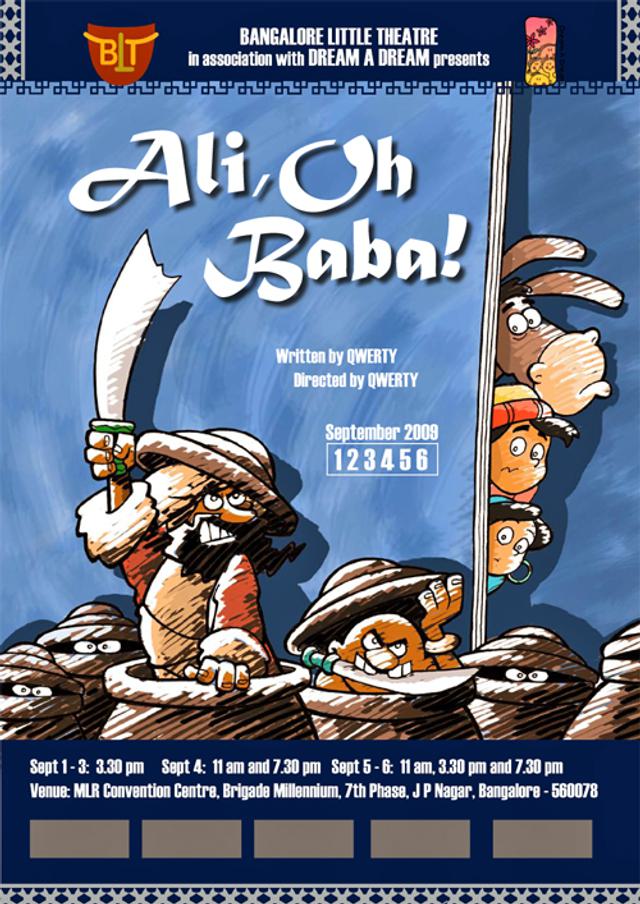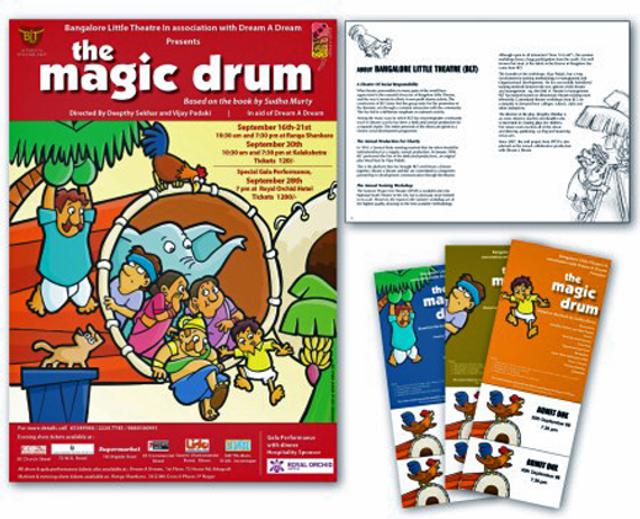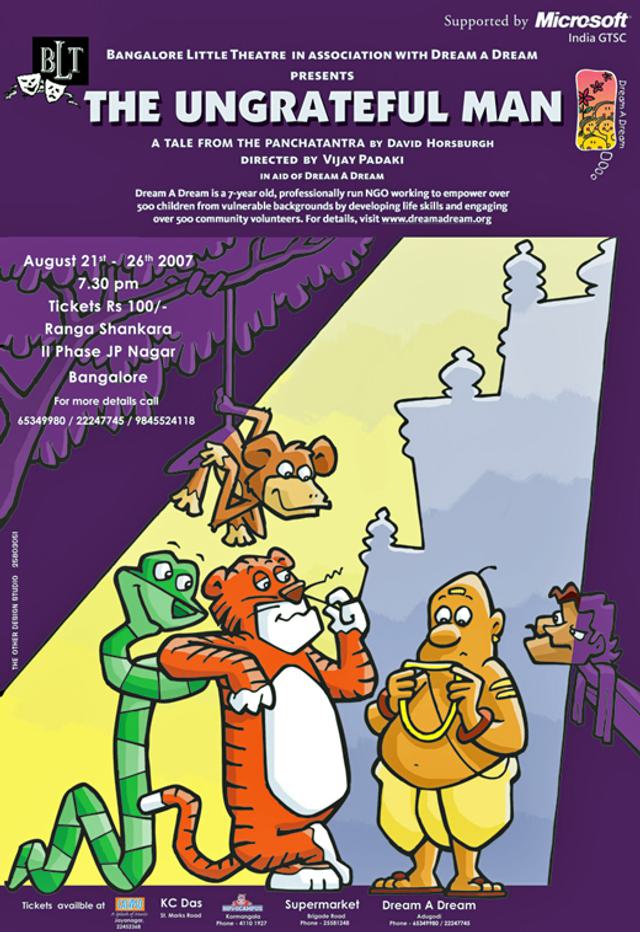Dream A Dream: evenings out at the Little Theatre, Bangalore
- Exhibited by
- Sattva.
- Added
- June 06, 2012
- Medium of Communication
- Cinema
- Target Audience
- Individuals, corporations
- Type of Charity
- Children, youth and family, community & social services, social change
- Country of Origin
- India
- Date of first appearance
- August, 2007
SOFII’s view
We hear the phrase 'win win' bandied about a lot in the voluntary sector. Here's a truly great example explained in full detail so that anyone can learn its lessons and put its ideas into practice. The audience gets to see a great production, the theatre promotes its play and helps a worthy local cause. And Dream A Dream can raise lots of useful funds while offering its supporters an entertaining evening out. That's better than 'win win' – it's 'win, win, win!'
Creator / originator
Bangalore Little Theatre and Dream A Dream.
Summary / objectives
Bangalore Little Theatre (BLT) is the oldest theatre society in Bangalore and is committed to maintaining a social development perspective in all its activities. Dream A Dream (DAD) is a nonprofit organisation that works with children from vulnerable backgrounds to develop critical life skills. Since 2007, these two organisations have come together to stage an annual theatre production. The entire proceeds of the shows go towards Dream A Dream's social development programmes. The plays have been huge successes and a unique experience for the Bangalore public. The annual productions have also acquired a 'brand' and theatre lovers in Bangalore look forward to these partnership productions.
Background
In 1995, BLT decided to organise a regular annual production, the proceeds of which would be dedicated to a chosen well-regarded NGO. In January 1996, BLT performed the first of the productions – an original play, Head Start, by a life member of the group, Vijay Padaki. Since then, the policy has been put into practice regularly. In 2007, BLT approached Dream A Dream to work together on these annual productions. As part of the agreement, a play is chosen in the broad category of family entertainment that appeals to children and adults. There are at least 10 performances spread across a week in Bangalore and, if possible, in two different parts of the city. Each is an original production, with the first shows in Bangalore exclusively for Dream A Dream. There may be additional shows later, but only after the shows for Dream A Dream. The tasks and responsibilities are distributed between Dream A Dream and BLT. BLT concentrates on the production-related tasks. Dream A Dream assists in promotin
Special characteristics
Collaborative model: Bangalore Little Theatre and Dream A Dream are well known in Bangalore for their activities around theatre and social development respectively. Such a strategic alliance helps get the best out of both partners' strengths. BLT focuses on choosing the right play and ensuring that the quality of the play is of the highest standard. Meanwhile, Dream A Dream uses their network with leading companies in India to raise funds for the events. They are able to pitch the sponsorship as an opportunity to support a sustainable development programme, as well as to promote culture and arts in the city.
Focus on the quality of the productions: both organisations focus on staging plays that are relevant for children as well as adults. While theatre is active in Bangalore, most plays are centred on an adult audience. Hence, this collaboration is able to attract a niche audience of school-aged children in addition to the regular theatre audience. By choosing the right plays (based on ancient Indian fables and modern short stories for children), they are able to convince schools to come for the weekday morning shows. A package was put together to target schools for bulk sales and was circulated to about 29 schools, 10 purchased bulk tickets in the first year.
Branding: such an effort aligned very well with Dream A Dream's focus on children. All schools were offered a discount on the ticket price and the amount of the discount was determined by the perception of what each school could afford. In 2008, Dream A Dream partners were also provided with free tickets to the show, which they enjoyed alongside children from mainstream schools.
Long term: most importantly, both BLT and Dream A Dream envisioned this partnership not as a one-time alliance but as a strategic relationship that can be maintained over a few years. Such an approach allows them to plan and optimise the scheduling and operations of the plays; and the process is becoming more streamlined each year, therefore reducing costs. In addition, they can pitch an opportunity for a sponsor to buy the property of a particular production for two to three years in a row and enjoy exclusive sponsorship benefits.
Influence / impact
In 2007, 11 productions of the play The Ungrateful Man (based on an ancient Indian fable) were staged and approximately 3,700 tickets were sold. Over 280,000 rupees were collected as funds and the overall profit from the production was about 300,000 rupees, including revenue from ticket sales and the costs of the production. In 2008, the organisations staged the playThe Magic Drum and increased the number of shows to 14 and sold close to 4,200 tickets. The overall profit from the production was close to 305,000 rupees. The 2009 production was Ali Baba and the Forty Thieves (based on the famous Arabian Nights fable).
Costs
The overall costs for the 2007 and 2008 productions were approximately 150,000 and 200,000 rupees respectively. The costs of the productions were substantially reduced by companies providing sponsorships in kind. For instance, Royal Orchid Hotels could not provide financial assistance for the play but were ready to host a gala show at the hotel for high net-worth individuals with cocktails and dinner. Thus, Dream A Dream had only to spend Rs 450 per head on food and a negligible amount for setting up a stage and priced the donor passes at Rs 1200/- per person.
Results
They are now looking to extend this partnership to create a multilateral partnership with two other organisations focusing on providing an infrastructure – a convention centre to stage the plays and handling end-to-end marketing respectively. This way, they will be able to create a successful partnership where each organisation stands to gain from the production.
Merits
The annual theatre production is a classic example of an exchange model, where all participants gain value through the collaboration. The audience, adults and children alike, enjoy an entertaining play by a leading theatre group. Dream A Dream is able to raise funds for its development activities. Bangalore Little Theatre is able to meet its objective to promote theatre and also to support a cause. Sponsors, many of whom are leading companies such as Microsoft, are able to associate with events that are focused on social development and the arts. Also, by not looking at the initiative as a one-off activity but a sustainable and long-term engagement, both the organisations have built a strong brand around the theatre production that can be used in the future as well.
 View original image
View original image


Also in Categories
-
-

















